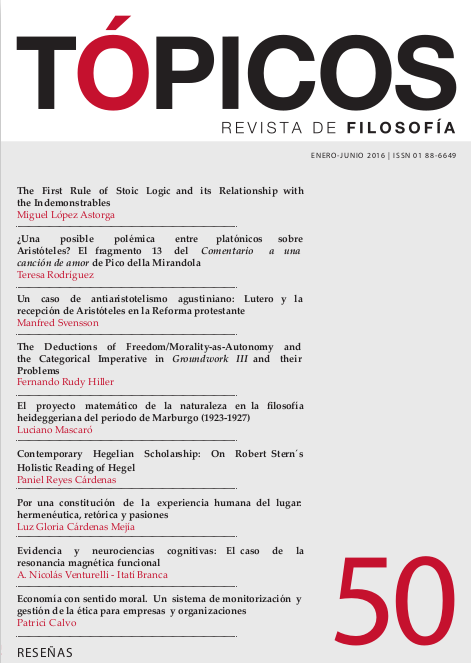The Deductions of Freedom/Morality-as-Autonomy and the Categorical Imperative in Groundwork III and Their Problems
Publicado 2015-12-20
Palabras clave
- Fundamentación,
- Kant,
- deducción,
- ley moral,
- hecho de la razón
Cómo citar
Resumen
El primer objetivo de este artículo es presentar una interpretación del tercer capítulo de la Fundamentación para establecer dos puntos: primero, que Kant ofrece ahí una deducción (en sentido kantiano) de la libertad/moralidad como autonomía a partir de premisas provenientes exclusivamente de la filosofía teórica. Segundo, que Kant ofrece también una deducción distinta del imperativo categórico. El segundo objetivo del artículo es examinar y criticar en detalle un paso crucial en estas deducciones, a saber, la inferencia de la existencia noumenal del sujeto como voluntad libre a partir de la espontaneidad especulativa de la razón. Muestro que Kant mismo rechaza esta inferencia en la edición B de la Crítica de la razón pura y argumento que esto explica el hecho de que Kant, en la Crítica de la razón práctica, abandona la deducción de la ley moral que había ofrecido previamente. Así, contra la lectura “reconciliacionista”, hay de hecho un gran cambio en la última obra.
Descargas
Referencias
- Allison, H. (1990) Kant’s Theory of Freedom, Cambridge: Cambridge University Press.
- Ameriks, K. (1982) Kant’s Theory of Mind, Oxford: Oxford University Press.
- ____ (2003, originally published 1981). Kant’s Deduction of Freedom and Morality. Interpreting Kant’s Critiques. (161-192). Oxford: Oxford University Press.
- Esteves, J. (2012). The Non-Circular Deduction of the Categorical Imperative in Groundwork III. Kant in Brazil. D. Perez & F. Rauscher (Eds.) (155-172). Rochester: University of Rochester Press.
- Henrich, D. (1989). Kant’s Notion of a Deduction and the Methodological Background of the First Critique. In Kant’s Transcendental Deductions. E. Forster (Ed.) (29-46). Stanford, CA: Stanford University Press.
- ____ (1994, originally published in 1960). The Concept of Moral Insight and Kant’s Doctrine of the Fact of Reason. The Unity of Reason. (55-88). Cambridge, MA: Harvard University Press.
- ____ (1998, originally published in 1975). The Deduction of the Moral Law: The Reasons for the Obscurity of the Final Section of Kant’s Groundwork. In Kant’s Groundwork of the Metaphysics of Morals: Critical Essays. P. Guyer (Ed.) (303-342). New York: Rowman & Li le eld.
- Kant, I. (1997). Critique of Practical Reason. M. Gregor (Trans.) Cambridge: Cambridge University Press.
- ____ (2007). Critique of Pure Reason. P. Guyer & A. Wood (Trans.) Cambridge: Cambridge University Press.
- ____ (2012). Groundwork of the Metaphysics of Morals. M. Gregor & rev. J. Timmermann (Trans.) Cambridge: Cambridge University Press.
- Korsgaard, C. (1996). Morality as Freedom. Creating the Kingdom of Ends. (159-187). Cambridge: Cambridge University Press.
- McCarthy, M. (1979). Kant’s Application of the Analytic/Synthetic Distinction to Imperatives. Dialogue 18, 373-391.
- ____ (1985). The Objection of Circularity in Groundwork III. Kant-Studien 76, 28-42.
- Paton, H. (1965). The Categorical Imperative, London: Harper.
- Rauscher, F. (2009). Freedom and Reason in Groundwork III. In Kant’s ‘Groundwork of the Metaphysics of Morals’: A Critical Guide. J. Timmermann (Ed.) (203-223). Cambridge: Cambridge University Press.
- Tenenbaum, S. (2012). The idea of Freedom and Moral Cognition in Groundwork III. Philosophy and Phenomenological Research, 84, 555-589.
- Timmermann, J. (2010). Reversal or Retreat? Kant’s Deductions of Freedom and Morality. In Kant’s ‘Critique of Practical Reason’: A Critical Guide. A. Reath and J. Timmermann (Eds.) (73-89). Cambridge: Cambridge University Press.






